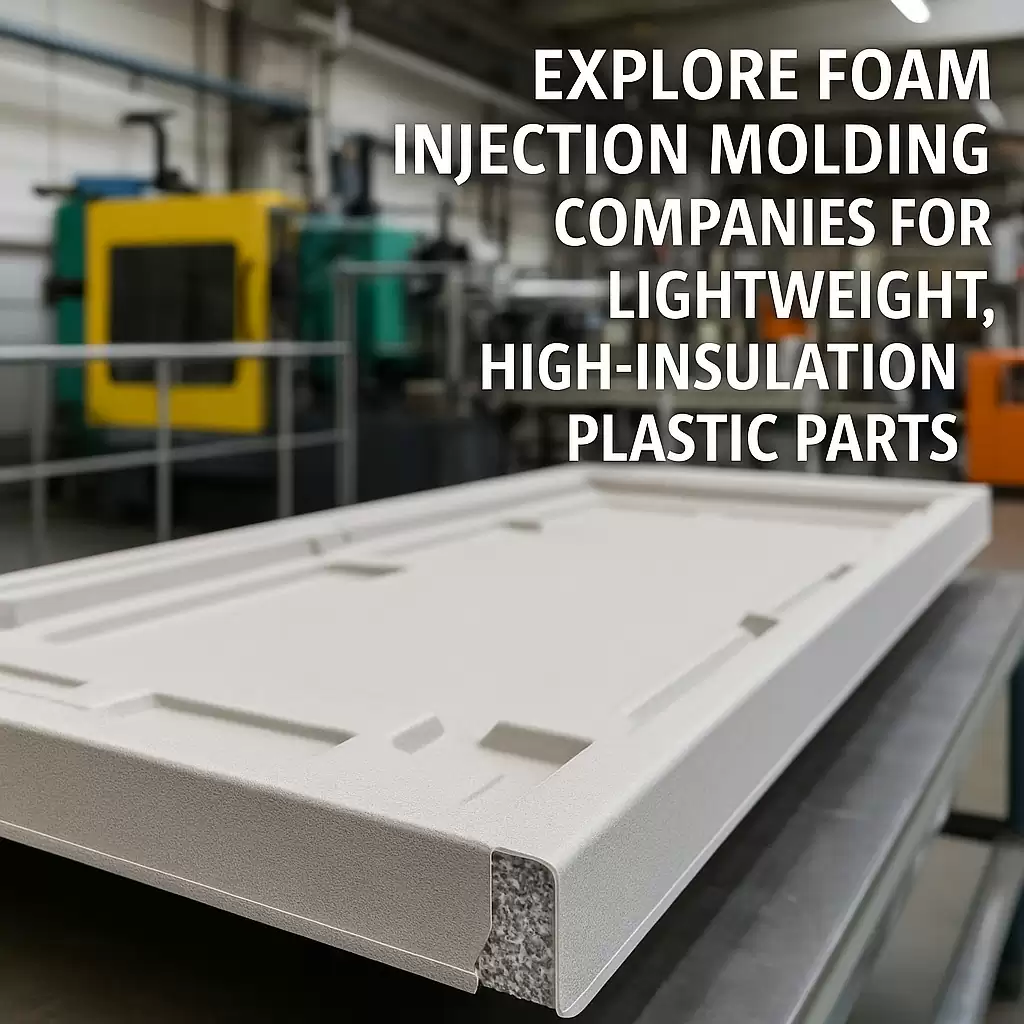Explore Foam Injection-Molding Companies for Lightweight, High-Insulation Plastic Parts
Explore Foam Injection-Molding Companies for Lightweight, High-Insulation Plastic Parts
Structural- or foam injection molding creates a micro-cellular core wrapped in a solid skin, giving designers the stiffness of a thick wall at a fraction of the weight. Whether you need energy-efficient appliance liners, vibration-damping equipment panels, or oversized outdoor housings, partnering with a specialist foam molder unlocks unique performance gains and cost savings. This guide explains the process advantages, key supplier capabilities, and how to shortlist the right partner for your next lightweight, high-insulation project.
1 | Why Choose Foam Injection Molding?
| Benefit | Typical Improvement vs. Solid Molding | Real-World Pay-off |
|---|---|---|
| Weight Reduction | 15 – 30 % density drop | Lower shipping cost, easier assembly |
| Thermal Insulation | λ value ↑ 20 – 40 % | Better appliance energy ratings |
| Dimensional Stability | Near-zero sink on 6–12 mm walls | Cosmetic “A-class” surfaces without secondary ops |
| Clamp-Force Cut | 30 – 60 % lower | Run big parts on smaller presses |
| Part Consolidation | One large, rib-free panel | Fewer fasteners, faster build times |
2 | What to Look for in a Foam-Molding Company
| Capability | Why It Matters |
|---|---|
| Low-Pressure, Large-Tonnage Presses (600 – 3 000 t) | Accommodates 1 m+ shot sizes at lower clamp force |
| Physical or Chemical Blowing Expertise | Matches process (SCF N₂, MuCell® CFA) to your resin and cost target |
| Advanced Cooling Simulation | Balances skin/core solidification for warp-free panels |
| Material Library | HDPE, PP-copolymer, PC/ABS, glass-filled nylon foam grades stocked locally |
| Inline Trimming & QA | Robot routers or CNC post-trim keep edge tolerances tight |
3 | Design Rules for High-Insulation, Lightweight Parts
-
Uniform 5–15 mm Walls – Core foam equalizes density; avoid sharp thickness transitions.
-
Ribless Stiffening – The sandwich structure eliminates the need for deep ribs.
-
Generous Draft (≥ 2°) – Low-pressure fill plus thick walls require easier ejection.
-
Texture Strategy – VDI 18-24 hides “swirl” patterns common in structural foam skins.
-
Gate Size & Location – Large edge or sprue gates maintain melt/foam mix integrity; hot runners rarely needed.
4 | Cost Snapshot (Appliance Sidewall, 800 × 450 × 60 mm)
| Metric | Solid PC/ABS | Foam PP-Copo (CFA) |
|---|---|---|
| Part Weight | 2.6 kg | 1.9 kg (-27 %) |
| Clamp Force | 1 100 t | 550 t |
| Cycle Time | 80 s | 60 s |
| Unit Cost* | US $10.20 | US $7.30 |
*Includes amortized tool and molding press cost at 40 s machine rate.
5 | Supplier-Qualification Checklist
| Question | Desired Answer |
|---|---|
| “Can you process both SCF and CFA foam?” | Yes—N₂ dosing + CFA masterbatch options |
| “Do you provide Moldflow Foam simulation?” | Yes—cell density, clamp-force prediction |
| “What’s your maximum platen size?” | ≥ 1 500 × 1 500 mm |
| “What inline QA do you use?” | Ultrasonic skin-thickness gauge, laser edge-trim inspection |
| “Lead time for aluminium prototype tool?” | ≤ 4 weeks |
6 | Tap Taiwan’s Foam-Molding Cluster for Speed & Value
Taiwanese foam injection-molding companies combine ISO 9001, IATF 16949 compliance with large-tonnage, low-pressure presses—ideal for rapid prototyping and mid-volume production of lightweight, insulated parts.
???? Internal Services for Your Foam Project
Next Steps
-
Define your weight-reduction or insulation goals.
-
Upload CAD to TaiwanMoldMaker.com for a 48-hour foam-specific DFM and cost comparison.
-
Prototype in aluminium—T-samples in three weeks.
-
Validate cell structure, burst strength, and thermal performance.
-
Scale in hardened steel once demand is proven.
Reduce weight, boost insulation, and save cycle time—all in a single process. Explore qualified foam injection-molding companies today with TaiwanMoldMaker.com and get your project moving in days, not months.









